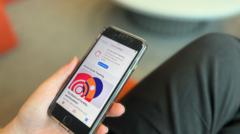Harriet Heywood
BBC News, Cambridgeshire
Women who tracked their menstrual cycle using smartphone apps have been warned about the privacy and safety risks of doing so.
A report from the University of Cambridge’s Minderoo Centre said the apps were a “gold mine” for consumer profiling and collecting information.
Academics cautioned that in the wrong hands, the data could result in health insurance “discrimination” and risks to job prospects.
Professor Gina Neff, executive director at the Minderoo Centre, said: “Women deserve better than to have their menstrual tracking data treated as consumer data, but there is a different possible future.”
The apps collect information on everything from exercise, diet and medication to sexual preferences, hormone levels and contraception use.
Academics at the Minderoo Centre for Technology and Democracy, an independent team of researchers at the university, said this data could give insights into people’s health and their reproductive choices.
The report added that many women used the apps when they were trying to get pregnant.
Researchers said data on who is pregnant, and who wants to be, was some of the “most sought-after information in digital advertising” as it led to a shift in shopping patterns.
“Cycle tracking apps (CTA) are a lucrative business because they provide the companies behind the apps with access to extremely valuable and fine-grained user data,” they said.
“CTA data is not only commercially valuable and shared with an inextricable net of third parties (thereby making intimate user information exploitable for targeted advertising), but it also poses severe security risks for users.”
The research team called for better governance of the “femtech” industry, improved data security of these apps and the introduction of “meaningful consent options”.
They also wanted bodies like the NHS to launch alternatives to commercial tracking apps with permission for the data to be used in valid medical research.
Dr Stefanie Felsberger, lead author of the report, said: “Menstrual cycle tracking apps are presented as empowering women and addressing the gender health gap.
“Yet the business model behind their services rests on commercial use, selling user data and insights to third parties for profit.
“There are real and frightening privacy and safety risks to women as a result of the commodification of the data collected by cycle tracking app companies.”
The report said work published by Privacy International showed major CTA companies had updated their approach to data sharing, but device information was still collected with “no meaningful consent”.
Additional reporting by PA Media.







